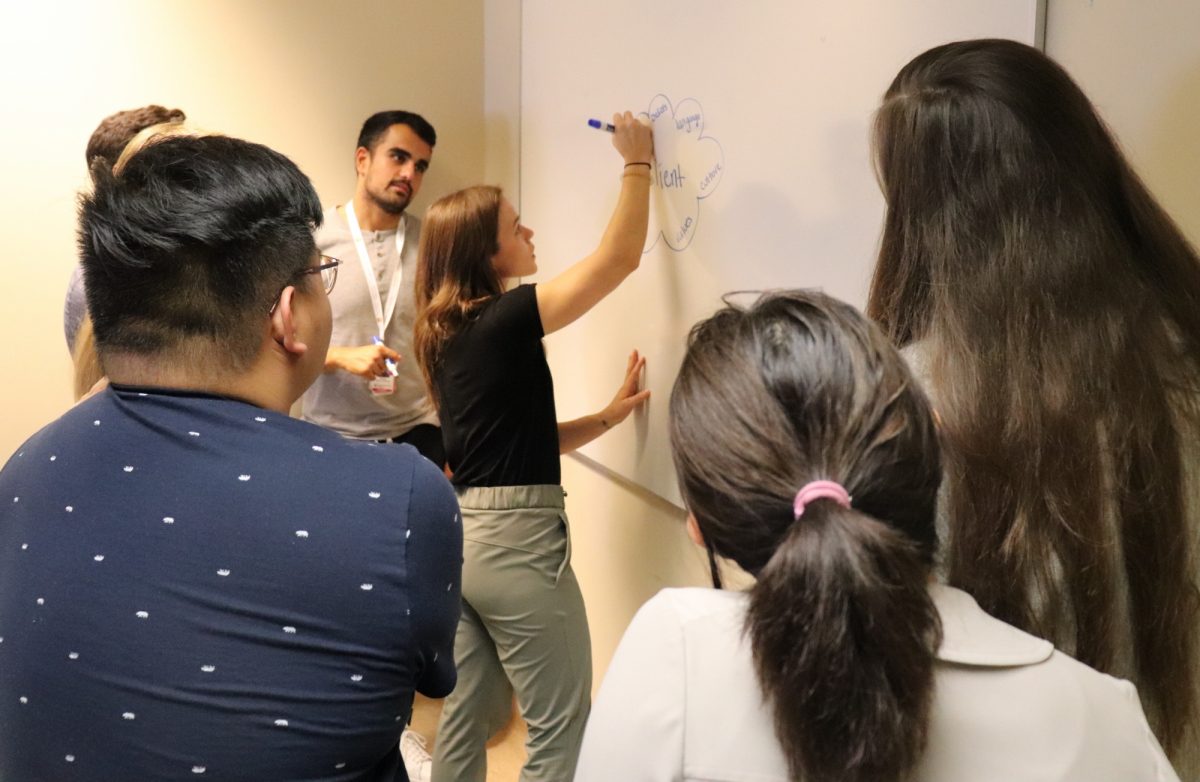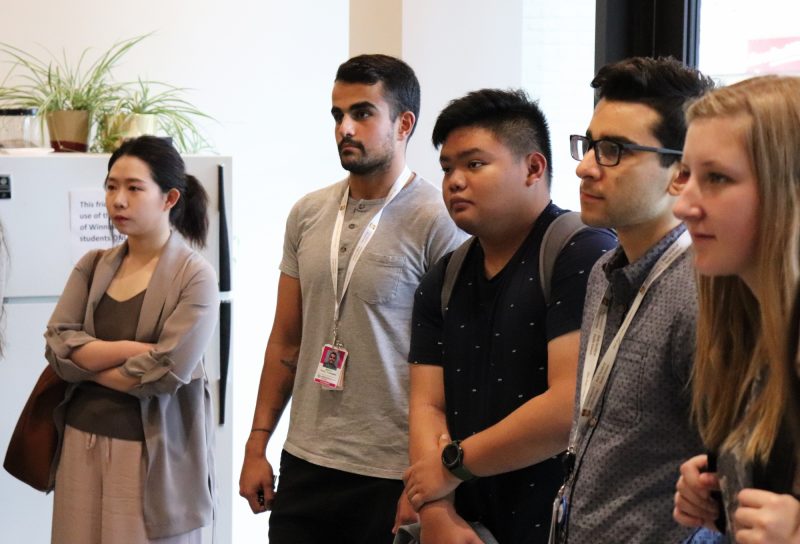
Megan Peterson (center) and members of team #331 brainstorm ideas as part of IPCC activities.
Interprofessional curriculum develops Rady Faculty students’ teamwork
Teamwork between the professions in the health sciences plays a major part in providing first-rate health care.
When students who are future dentists, dental hygienists, doctors, nurses, pharmacists and rehabilitation therapists work together on interprofessional collaborative care (IPCC) exercises and activities, they’re helping to break down traditional barriers between the professions and learning to work effectively in health-care teams.
All first- and second-year students in the Rady Faculty of Health Sciences take part in the curriculum. For the 2019-20 academic year, 591 first-year students and 423 second-year learners are involved in IPCC activities.
The students are placed on teams of eight to 10 learners, representing all five Rady Faculty colleges. Over a two-year period, they participate in face-to-face activities, online discussions and reflection exercises. The IPCC activities, coordinated by the Office of Interprofessional Collaboration (OIPC), began in 2016.
“The overall goal is to do what we can in laying the foundation for our learners to become collaborative practitioners,” said Dr. Moni Fricke, director of the OIPC. “We hope that the learners will recognize how important it is to collaborate as a team and can develop the necessary skills, attitudes and behaviours.”
UM Today interviewed three students from team #331, one of the 70 first-year teams. We spoke with Sue Zhang, nursing; Megan Peterson, occupational therapy; and Maziar Fazel Darbandi, medicine, about their IPCC experiences during the fall term.
Sue Zhang: What I found really interesting was that the people in the other programs have really different ways of thinking about some of the topics we’ve discussed this semester. It’s really interesting for me to express my thoughts and understand what my teammates are thinking.
Megan Peterson: I’ve always believed that collaboration is important on a team, but through our discussions I’ve come to learn that each professional is an expert in their role. They have knowledge that others don’t possess, and without all professionals working together, we can’t enable a client to maximize their health.
Maziar Fazel Darbandi: People who were in medical school 30 or 40 years ago didn’t have these opportunities to learn side by side with their colleagues from different professions, and that understanding is really going to change the workplace in the future.

Sue Zhang (left) and Maziar Fazel Darbandi (second from left) tour Merchants Corner with other Rady Faculty of Health Sciences students taking part in IPCC activities.
At the end of September, each first-year student team visited one of 30 community organizations, such as Siloam Mission or Winnipeg Harvest. Team #331 visited Merchants Corner, which is home to educational programs that bring students from diverse backgrounds together to learn about urban studies and inner-city issues.
MP: The initial face-to-face event at Merchants Corner, with a follow-up discussion, allowed us to bond and get to know the people that we’ll be working with over the next two years.
MFD: It was a great experience for me. I didn’t know that a program like Merchants Corner existed in Winnipeg. It was really interesting to see how their model really works, transitioning people from high school to university and making university more approachable.
Over the course of the fall term, the students took part in three online discussions. To begin, the learners had to answer a question, and after posting their answer, they could see their teammates’ responses. The students then had to comment on at least one of their teammates’ responses.
MFD: After you make your original post you can see what the others have said, which is really interesting because then you see how, without even meaning to, you have similar trains of thought and ideas. It can also be eye-opening, in a good way, to see the other perspectives. I’ve really enjoyed that aspect of it.
MP: During our online discussions, I really enjoyed hearing the different perspectives from other professions. In our third online discussion, we were asked if we agreed or disagreed with the statement “We should treat poverty like any other health condition.” This was the first time we had a disagreement in our group. It was interesting to see which professionals would consider the lived experience as within their scope of practice.
SZ: I found that it’s hard to convince people. Even though you tried to convince others and express your thinking, sometimes people would insist on their own opinions. But even though people held different perspectives for some topics, we respected each other. We’ve created a pretty respectful environment.
The students applied what they learned from the IPCC activities to their other courses.
MFD: In our population health course we learn a lot about social determinants of health, and a lot of our online discussion posts were also about that, so I found that really helpful. The information we learned in our class and in IPCC mix so well.
MP: Right now I’m on my first master of occupational therapy fieldwork placement at Community Therapy Services. Learning about team functioning, communication, and the stages of group development through the IPCC curriculum has been very useful when working on a team with clients, case coordinators, occupational therapists, physiotherapists, families and other professionals. I’ve been able to observe and take part in interprofessional collaboration, which has really tied into the objectives of the IPCC learning.
The students ended the term with a reflection exercise, each writing 350 to 1,000 words about their IPCC experience. During the interview, the students reflected on what they’ve learned, and what they hope to learn over the next three terms.
MFD: Providing more accessible health care is something I’m really passionate about, and in my future as a physician it’s a big issue I want to help tackle. Something I’ve learned about myself is that I won’t be able to do that in a magnitude that will make a difference unless I’m able to collaborate with others. Learning more about what the other health-care professionals have to offer allows me to see more clearly how it’s possible to provide more accessible health care.
SZ: At the beginning of the year, I didn’t expect teamwork to be as important as it is. I thought as a nurse, I should do my job – that’s the major thing. Now I think communication is another important thing, because if you don’t have good communication skills, you can’t provide patient-centered care. We have to work as a group.
MP: By the end of the two years, I hope to understand the roles of other professionals on the team and feel comfortable collaborating with others to better serve our clients.
SZ: Empathy is very important. It’s hard to consider and cover all the factors that affect the patient’s health. I think I have to push myself over the next three terms to learn more – how to put myself in the patient’s position.
MFD: I’m making connections with other professionals in different fields, so in the future, perhaps if I have a question about what an occupational therapist does or what a physiotherapist does or what they might offer one of my patients, rather than reaching out to a stranger, I have friends in different professions who could help me out.
We will follow up with the members of team #331 over the next three terms while they continue their interprofessional journeys.







What a fantastic idea to provide future healthcare providers the opportunity to collaborate! Have you considered including Human Nutritional Sciences students in the IPCC? Many HNS students will go on to become registered dietitians, who are part of the team in various healthcare environments (whether acute care, outpatient, in the community, long-term care, etc.) so it would be excellent for them to be part of this valuable program. (I’m a registered dietitian who completed my studies at the U of M and can attest to the importance of being able to effectively collaborate with an multidisciplinary team in healthcare settings.) I know HNS is part of a different faculty, but perhaps it’s worth exploring 🙂